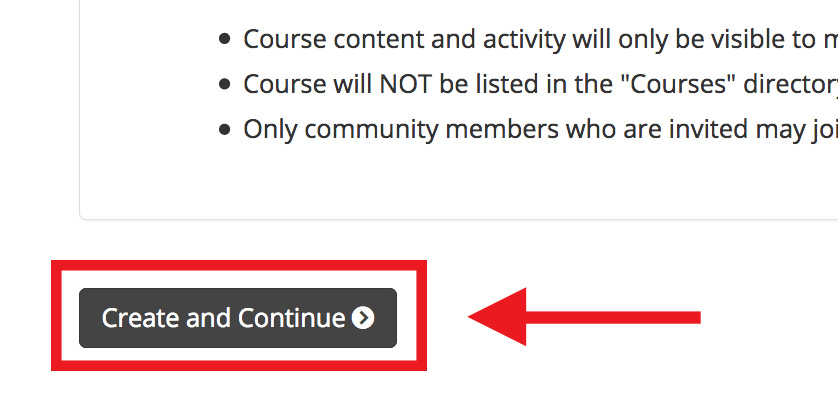How to Clone a Course (Faculty Only)
Cloning a course will create an exact copy of an existing course, keeping all content you created or uploaded, but student work will not be copied over. The course avatar, course settings, and site settings will all remain the same, although you can change anything as necessary.
After logging in, click My Profile in the main menu. Then click My Courses in the right-hand menu. On the My Courses page, click + Create/Clone a Course at the top of the page.

Step One: Course Creation
- On the course creation page, choose Clone an Existing Course, and then in the drop-down menu, select the course you would like to clone.
- Enter the required information, including the Course Name, Course URL, and Course Description. You can change any of the information, besides the URL, later.
- The Course Name will be displayed publicly. Creating an explicit name will make it easier for others to find. The name can be the same as the course you are cloning.
- The Course URL for the course you are cloning cannot be used and cannot be changed, so take a moment and consider the URL carefully. The URL, or web address, is what you see in the location bar of your browser. Once finished, it will display as follows: https://openlab.oneonta.edu/groups/CourseName/.
- Upload an avatar that reflects the subject or topic of your course. If you have an image file ready that you would like to use as your avatar, click and drag or Select your File. Select the file you want to use from your computer or flash drive and then click Upload Image. If you don’t have an image you would like to use you can always add one later–if you are finished skip to step 7.
- Crop the image by dragging the square around the portion of the image you want to use and then click Crop Image.
- You’ll notice that the Course Description is already filled in and is the same as the course you are cloning. The School, Department, Course Code, and Section Code are also pre-filled (if the information has already been filled from the course you are cloning). You can leave these as they appear or edit.
- Sharing settings. This setting enables other members to clone your course. If enabled, other members can reuse, remix, transform, and build upon the material in this course. Attribution to original Course authors will be included.
- Academic Units Select one or more schools to which you department you apply to:
- Economics and Business
- Education, Human Ecology, and Sports Studies
- Liberal Arts
- Sciences
- You can insert the academic Term for this course. Example: Fall 2020. The academic Term is already prefilled from the course you are cloning, be sure to type in the correct Semester and Year.
- Course Contact. By default, you are the Course Contact. You may add or remove Course Contacts once your portfolio has more members.
- Course Information is not required, but adding this information will make it easier for others to find your Course
Course Privacy Settings
Choose your Course privacy settings. These settings control the course profile’s privacy and are different from the course site, which you will choose next. You can change the settings at any time.
This is a public course:
- The course profile and related content and activity will be visible to the public, whether they are members of the SUNY Oneonta OpenLab.
- The course profile will be listed in the SUNY Oneonta OpenLab course directory and search results.
- Any SUNY Oneonta OpenLab member may join this course. Choose your Course privacy settings. These settings control the course profile’s privacy and are different from the course site, which you will choose next. You can change the settings at any time.
This is a private course:
- The course profile and related content and activity will only be visible to members of the course.
- The course profile will be listed in the course directory and search results.
- Only SUNY Oneonta OpenLab members who request membership and are accepted by the administrator may join this course.
This is a hidden course:
- The course profile, related content, and activity will only be visible only to the course members.
- The course profile will NOT be listed in the course directory and search results.
- Only SUNY Oneonta OpenLab members who are invited may join this course.
When you have selected your privacy settings for your Course, select Create and Continue.

Step Two: Associated Site Creation
- If you created a site from the course you are cloning, the selection will be automatically selected and have generated the URL for you.
- If not, choose whether you want to set up a site. Each course can have an optional associated site. This is a WordPress site that all members of your course can access and contribute to. Select Set up a site (if not skip to the next section, “Step 3: Inviting Members”). The URL (e.g., https://MySite.openlab.oneonta.edu/) cannot be changed, so take a moment and consider the URL carefully.
- If you have an existing OpenLab site that is not already linked to a Course, Project, Club, or Portfolio you can choose Use an existing site for your course.
Please note: This option will not appear if you do not have an existing site that is not currently linked to a project, course, club, or portfolio. - If you have an existing site that is not on the SUNY Oneonta OpenLab, you can choose Use an external site for your course. If you choose this option, you can check for an RSS feed so that activity is displayed on the profile page. To do so, type in the URL and click the Check button. If it does not automatically find a feed you can type one in yourself.
Site Privacy Settings
- Next, choose the privacy settings for your course site. These settings will not appear if you did not set up a site on the previous page.
Public
- Allow search engines to index this site:
- Anyone can visit your site without needing a password.
- Search engines will index all pages and posts, meaning your site will show up in search results on Google, Bing, and others.
- Choose this option for maximum public visibility.
- Ask search engines not to index this site:
- Visitors do not need a password to see your site if they know the URL or are linked from elsewhere, but Google, Bing, and other search engines should not index your posts and pages.
Please note: it is up to search engines to honor your request. - Choose this option if you want to be able to show the blog to people who are not members of the SUNY Oneonta OpenLab, but you don’t want people to stumble upon it via search engines.
- Visitors do not need a password to see your site if they know the URL or are linked from elsewhere, but Google, Bing, and other search engines should not index your posts and pages.
Private
- I would like my site to be visible only to registered users of SUNY Oneonta OpenLab:
- Anyone who is signed into SUNY Oneonta OpenLab can see this site.
- Choose this option if you’d only like the SUNY Oneonta OpenLab community to be able to see the site.
- I would like my site to be visible to registered users of this Course:
- Only members of your course will be able to visit the site.
- Choose this option if you only want enrolled students to be able to see the site.
Hidden
- I would like my site to be visible only to site administrators:
- No one except site admins (only the professor, unless you add others) can see the site.
- You may choose this option if you are in the process of creating your course site, but it would rarely be useful during an active course.
Member Role Settings
These settings control the default member roles on your associated site when members join the group. You may also adjust individual member roles in the Membership settings and on the site’s Dashboard.
In the selections, you will see the default member roles:
Group members have the following role on the associated site:
Author
Group moderators have the following role on the associated site:
Editor
Group administrators have the following role on the associated site:
Administrator
Member roles consist of:
- Author – manage and publish their posts
- Editor – manage and publish posts including other users
- Administrator – Able to access all the functions of the WordPress back end. Have full capabilities to manage and publish any content, manage plugins and themes, edit code, and delete other user accounts
- Contributor – can write and manage their posts but cannot publish them
- Subscriber – can only read and manage their profile
When you are finished with step two select Next Step.
Step Three: Inviting Members
Find more information go to How to Invite and Manage Members.
- If you would like to invite members to your Course, start typing their display name. When a drop-down list appears, select their name from the list. Their name and avatar will appear under the heading Invites. When you’re finished, or if you do not wish to invite anyone at this time (you can always do it later!), click Finish.
- After you click Finish you will see your new Course Profile page! From here, you can (a) change settings such as privacy, Course description, or (b) change your avatar. From your Course Profile you can also access your (c) Course Site and Dashboard (the admin panel, where you will edit and add content to your Course Site).

